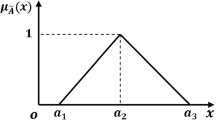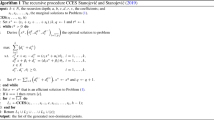Abstract
This paper presents optimality criteria for fuzzy-valued fractional multi-objective optimization problem. There are numerous optimality criteria which have been established for the deterministic fractional multi-objective optimization problems. Very few studies are available on the establishment of optimality criteria for fuzzy-valued multi-objective optimization problem. So, Karush–Kuhn–Tucker optimality criteria for fuzzy-valued fractional multi-objective problem are established by using Lagrange multipliers. First, the original problem is modified using the parametric approach of Dinkelbach into multi-objective non-fractional optimization problem, and then, the optimality conditions are established for the modified problem using the Hukuhara derivative. The established optimality criteria are verified by two numerical examples.
Similar content being viewed by others
References
Bazarra MS, Sherali HD, Shetty CM (1993) Nonlinear programming. Wiley, New York
Bellman R, Zadeh LA (1970) Decision making in a fuzzy environment. Manag Sci 17(4):141–164
Dinkelbach W (1967) On non linear fractional programming. Manag Sci 13:7
Ezzati R, Khorram E, Enayati R (2013) A new algorithm to solve fully fuzzy linear programming problems using the MOLP problem. Appl Math Model 39:3183–3193
Gadhi N (2008) Necessary and sufficient optimality conditions for fractional multi-objective problems. Optimization 57:527–537
Hosseinzade E, Hassanpour H (2011) The Karush–Kuhn–Tucker optimality conditions in interval-valued multiobjective programming problems. J Appl Math Inf 29:1157–1165
Hukuhara M (1967) Integration des applications measurables dont la valeur est un compact convexe. Funkc Ekvacioj 10:205–223
Jagannathan R (1966) On some properties of programming problems in parametric form pertaining to fractional programming. Manag Sci 12:609–615
Jayswal A, Stancu-Minasian I, Ahmad I (2011) On sufficiency and duality for a class of interval-valued programming problems. Appl Math Comput 218:4119–4127
Kato K, Sakawa M (1997) An interactive fuzzy satisfying method for multi-objective linear fractional programs with block angular structure. Cybern Syst Int J 28:245–262
Kaur J, Kumar A (2013) Mehar’s method for solving fully fuzzy linear programming problems with L-R fuzzy parameters. Appl Math Model 37:7142–7153
Kumar A, Kaur J, Singh P (2011) A new method for solving fully fuzzy linear programming problems. Appl Math Model 35:817–823
Lotfi FH, Allahviranloo T, Jondabeha MA, Alizadeh L (2009) Solving a fully fuzzy linear programming using lexicography method and fuzzy approximate solution. Appl Math Model 33:1464–1475
Medhane DV, Sangaiah AK (2017) Search space-based multi-objective optimization evolutionary algorithm. Comput Electr Eng 58:126–143
Najfi HS, Edalatpanah SA (2013) A note on “A new method for solving fully fuzzy linear programming problems”. Appl Math Model 37:7865–7867
Osana-Gomez R, Rufian-Lizana A, Ruiz-Canales P (2000) Multiobjective fractional programming with generalized convexity. Soc Estad Invest Oper Top 8(1):97–110
Pathak VD, Pirzada UM (2011) Necessary and sufficient optimality conditions for nonlinear fuzzy optimization problem. Int J Math Sci Educ 4:1–16
Pop B, Dumitrescu S (2005) Fully fuzzified linear fractional programming problem—a trapezoidal numbers approach. ROMAI J 1(2):143–148
Pop B, Stancu-Minasian IM (2008) A method of solving fully fuzzified linear fractional programming problem. J Appl Math Comput 27:227–242
Puri ML, Ralescu DA (1983) Differentials of fuzzy functions. J Math Anal Appl 91:552–558
Sakawa M, Yano H, Takahashi J (1992) Pareto optimality for multiobjective linear fractional programming problems with fuzzy parameters. Inf Sci 63:33–53
Sangaiah AK, Samuel OW, Li X, Abdel-Basset M, Wang H (2017) Towards an efficient risk assessment in software projects–fuzzy reinforcement paradigm. Comput Electr Eng. https://doi.org/10.1016/j.compeleceng.2017.07.022
Singh D, Dar BA, Kim DS (2016) KKT optimality conditions in interval valued multiobjective programming with generalized differentiable functions. Eur J Ope Res 254:29–39
Qiu T, Wang H, Li K, Ning H, Sangaiah AK, Chen B (2018) A novel machine learning algorithm for spammer identification in industrial mobile cloud computing. IEEE Trans Ind Inf. https://doi.org/10.1109/TII.2018.2799907
Veeramani C, Sumathi M (2014) Fuzzy mathematical programming approach for solving fuzzy linear programming problem. RAIRO Oper Res 48:109–122
Veeramani C, Sumathi M (2016) Solving the linear fractional programming problem in a fuzzy environment: numerical approach. Appl Math Model 40:6148–6164
Wang Y, Wang L, Sangaiah AK (2017) Generalized pythagorean fuzzy information aggregation operators for multi-criteria decision making. In: IEEE international conference on natural computation, fuzzy systems and knowledge discovery (ICNC-FSKD), pp 1410–1415
Wu HC (2003) Saddle point optimality conditions in fuzzy optimization problem. Fuzzy Optim Decis Mak 3:261–273
Wu HC (2007a) The Karush–Kuhn–Tucker optimality conditions for the optimization problems with fuzzy-valued objective functions. Math Methods Oper Res 66:203–224
Wu HC (2007b) The Karush–Kuhn–Tucker optimality conditions in an optimization problem with interval-valued objective functions. Eur J Oper Res 176:46–59
Wu HC (2008a) The optimality conditions for optimization problems with fuzzy-valued objective functions. Optimization 57:473–489
Wu HC (2008b) Optimality conditions for linear programming problems with fuzzy coefficients. Comput Math Appl 55:2807–2822
Wu HC (2008c) On interval-valued nonlinear programming problems. J Math Anal Appl 338:299–316
Wu HC (2009a) The Karush–Kuhn–Tucker optimality conditions for multi-objective programming problems with fuzzy-valued objective functions. Fuzzy Optim Decis Mak 8:1–28
Wu HC (2009b) The optimality conditions for optimization problems with convex constraints and multiple fuzzy-valued objective functions. Fuzzy Optim Decis Mak 8:295–321
Wu HC (2009c) The Karush–Kuhn–Tucker optimality conditions for multi-objective programming problems with interval-valued objective functions. Eur J Oper Res 186:49–60
Yu N, Qiu D (2017) The Karush–Kuhn–Tucker optimality conditions for the fuzzy optimization problems in the quotient space of fuzzy numbers. Complexity 2017:1–8. https://doi.org/10.1155/2017/1242841
Zadeh LA (1965) Fuzzy sets. Inf Control 8:338–353
Zimmermann HJ (1978) Fuzzy programming and linear programming with several objective functions. Fuzzy Sets Syst 1:45–65
Zimmermann HJ (1991) Fuzzy set theory and its applications, 2nd edn. Kluwer-Nijhoff, Hinghum
Author information
Authors and Affiliations
Corresponding author
Ethics declarations
Conflict of interest
All the authors declare that they have no conflict of interest.
Ethical approval
This article does not contain any studies with human participants or animals performed by any of the authors.
Additional information
Communicated by A. K. Sangaiah, H. Pham, M.-Y. Chen, H. Lu, F. Mercaldo.
Publisher's Note
Springer Nature remains neutral with regard to jurisdictional claims in published maps and institutional affiliations.
Rights and permissions
About this article
Cite this article
Agarwal, D., Singh, P., Li, X. et al. Optimality criteria for fuzzy-valued fractional multi-objective optimization problem. Soft Comput 23, 9049–9067 (2019). https://doi.org/10.1007/s00500-018-3508-z
Published:
Issue Date:
DOI: https://doi.org/10.1007/s00500-018-3508-z




